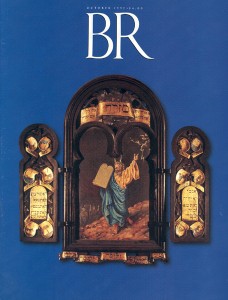Israel and Revelation
The particularity of God’s revelation to the ethnic group Israel and the universality of the Christian community need not be in conflict.

During this turbulent century, probably the most violent in human history, many people have wondered whether “the created order of society, in one way or another, corresponds to an underlying order of the universe.”1 A recent leader in the search for order was the Catholic political philosopher Eric Voegelin, who initiated a study, in five volumes, on the subject of order in history. The first and fundamental volume is titled Israel and Revelation.2
Voegelin’s central thesis is that Israel’s exodus from Egypt was not just a political event in world history but an exodus from a symbolic world that had enabled ancient empires like Egypt to see themselves as belonging to a cosmic order. Gods and humans, cosmos and history, the heavenly order and the earthly empire, were bound up in one compact whole. Israel, however, broke from this “cosmological symbolism” and achieved a sense of “transcendence,” that is, an awareness of the Rule of God, which cannot be identified with the political order of empire.
Already a library member? Log in here.
Institution user? Log in with your IP address.

